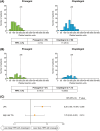Differences in P2Y12 Reaction Units Between Prasugrel and Clopidogrel by Ischemic Cerebrovascular Disease Subtypes - Subanalysis From ACUTE-PRAS
- PMID: 40937038
- PMCID: PMC12421135
- DOI: 10.1253/circrep.CR-25-0077
Differences in P2Y12 Reaction Units Between Prasugrel and Clopidogrel by Ischemic Cerebrovascular Disease Subtypes - Subanalysis From ACUTE-PRAS
Abstract
Background: We previously reported that prasugrel treatment resulted in stable inhibition of platelet aggregation compared with clopidogrel in patients with acute large artery atherosclerosis (LAA) or high-risk transient ischemic attack (TIA). However, the differences by disease subtypes were not assessed. This subgroup analysis of the open-label ACUTE-PRAS study examined differences in P2Y12 reaction units between prasugrel and clopidogrel by disease subtypes (acute LAA and high-risk TIA).
Methods and results: We measured platelet reaction units (PRU) by disease subtypes for each treatment arm. Eighty-eight patients were included in each treatment arm in the full analysis. In the prasugrel group, there were 61 (69.3%) patients with LAA and 27 (30.7%) patients with high-risk TIA. In the clopidogrel group, there were 64 (72.7%) patients with LAA and 24 (27.3%) patients with high-risk TIA. Among patients with LAA, PRU at Day 5 were numerically lower in the prasugrel group than in the clopidogrel group (arithmetic mean±standard deviation at Day 5: 128.8±49.0 vs. 178.9±60.5). In contrast, PRU at Day 5 were similar between prasugrel and clopidogrel in patients with high-risk TIA.
Conclusions: Prasugrel may have the potential to elicit stronger platelet aggregation inhibitory effects compared with clopidogrel in patients with acute LAA.
Keywords: CYP2C19; Clopidogrel; Large artery atherosclerosis; Prasugrel; Transient ischemic attack.
Copyright © 2025, THE JAPANESE CIRCULATION SOCIETY.
Conflict of interest statement
S.F. received research funding from Daiichi Sankyo Co., Ltd, and honoraria from Daiichi Sankyo Co., Ltd, Pfizer Japan Inc., and Bristol-Myers Squibb K.K. Y.I. received research funding from Medical Concierge Co., Ltd, Otsuka Pharmaceutical Co., Ltd, and Nagatanien Co., Ltd, and honoraria from Chugai Pharmaceutical Co., Ltd, and Daiichi Sankyo Co., Ltd. H.Y. received research funding from Bristol-Myers Squibb K.K., and Daiichi Sankyo Co., Ltd, honoraria from Daiichi Sankyo Co., Ltd, Otsuka Pharmaceutical Co., Ltd, Stryker Japan K.K., Medtronic Japan K.K., Boston Scientific Japan K.K., Abbott Japan L.L.C., and Bristol-Myers Squibb K.K., and is affiliated with endowed departments by Japan Agricultural Cooperatives of Ibaraki Prefecture. M.K. received research funding from Daiichi Sankyo Co., Ltd, and Nippon Boehringer Ingelheim Co., Ltd, and honoraria from Daiichi Sankyo Co., Ltd. R.I. and O.M. received honoraria from Daiichi Sankyo Co., Ltd. Y.Y. received research funding from Daiichi Sankyo Co., Ltd, and honoraria from Daiichi Sankyo Co., Ltd and Eisai Co., Ltd. N.K. received research funding from Daiichi Sankyo Co., Ltd, and honoraria from Stryker Japan K.K. T.S. and Y.M. received research funding from Daiichi Sankyo Co., Ltd. S. Arakawa received research funding and honoraria from Daiichi Sankyo Co., Ltd. R.T. received research funding from Daiichi Sankyo Co., Ltd, and honoraria from Daiichi Sankyo Co., Ltd, and Bayer Yakuhin Ltd. W.H., S. Abe, G.K., and T.F. are employees of Daiichi Sankyo Co., Ltd. K. Kimura received research funding from Daiichi Sankyo Co., Ltd, and Medtronic plc., consulting fees from Daiichi Sankyo Co., Ltd, and honoraria from Daiichi Sankyo Co., Ltd, and Bayer Yakuhin, Ltd. K. Kowata, Y.T., K.O., H.M., and T.U. have no conflicts of interest to disclose.
Figures



References
-
- Capodanno D, Alberts M, Angiolillo DJ.. Antithrombotic therapy for secondary prevention of atherothrombotic events in cerebrovascular disease. Nat Rev Cardiol 2016; 13: 609–622. - PubMed
-
- Gupta A, Baradaran H, Schweitzer AD, Kamel H, Pandya A, Delgado D, et al.. Carotid plaque MRI and stroke risk: A systematic review and meta-analysis. Stroke 2013; 44: 3071–3077. - PubMed
-
- Edlow JA.. Managing patients with transient ischemic attack. Ann Emerg Med 2018; 71: 409–415. - PubMed

